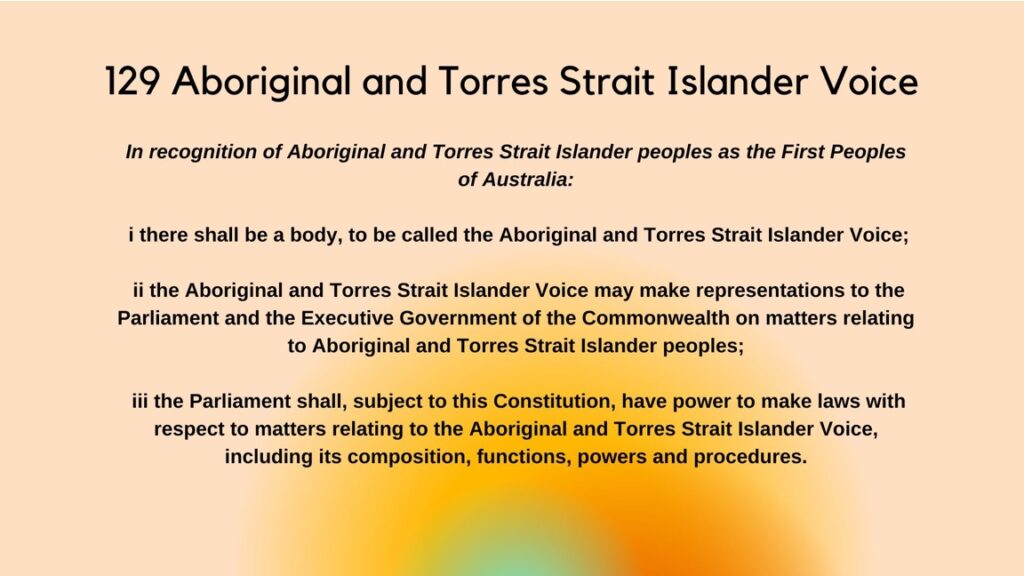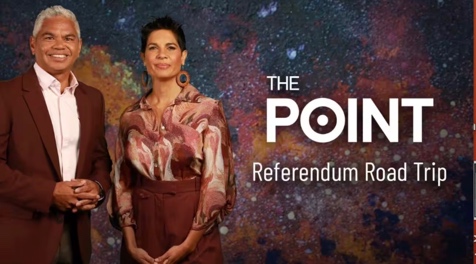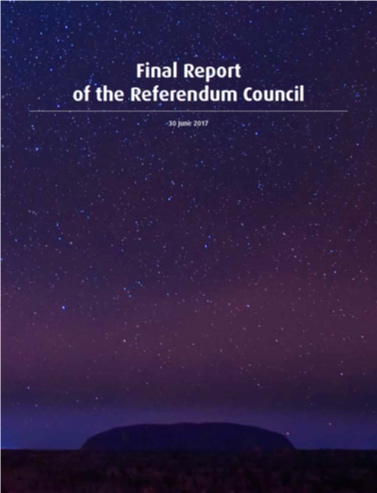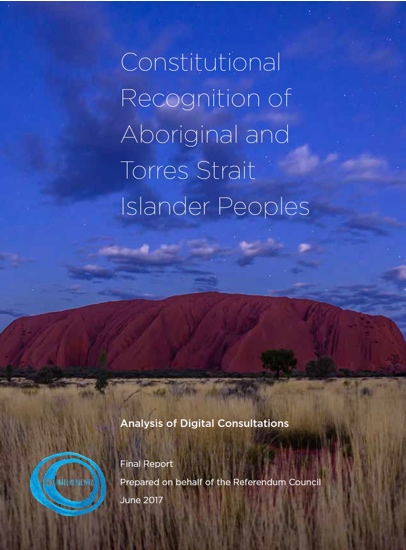The values-based argument against constitutional change is compelling, except it’s not the change being proposed in Saturday’s referendum. Steve Sharp reports.

I recall a time in the eighties – in the early analogue days of community broadcasting – when the community radio sectors of Sydney and Brisbane were emerging. We were being asked – some thought pressured – into ceding airtime to Aboriginal programs. In Brisbane, a well-known show called The Murri Hour became two, three and eventually a patchwork of extended hours across the week. The discomfort of non-indigenous broadcasters was not just about standards; it was about loss of control. Their gain was our loss.
I thought about those interactions recently during the current debate over a constitutional voice to parliament. My anxiety this time was about diminishing clarity – the more I hear, the less I know – driven by a polarising information war. Rancour over racial divisiveness has become self-fulfilling. The exception is NITV and its program The Point which conducts its own televised consultations each week in different locations across state lines. Its coverage moves to a different dynamic: less ideological, a less restrictive format untethered to the 24-hour news cycle, a genuine interest in diversity of opinion within indigenous communities, and less rancour. Mainstream audiences were missing out, I thought.
Looking back, we were youthful optimists living up to the community ethos of access. We knew we were doing something significant but had no idea where it would lead. In any event, it was not our journey and our indigenous co-workers – over decades – were given time, space and resources to flourish. Now they are giving back – if only we’d care to tune in. Indigenous broadcasting is a national achievement.

Could the voice referendum – if passed – represent a similar moment? Perhaps, but it offers hope rather that guarantees. The evangelism of some of the Yes campaigning has been over-wrought, turning off many who are more circumspect, like myself. High-gear polemics from all sides assail our senses; assemblages of facts constantly re-form to poke some new corner of our political imagination. In the background, low frequency noise humming the anthem of the constitutional reform contest: ‘take no prisoners’.
The No campaign has its own evangelists, like Greg Sheridan, foreign editor for The Australian who has joined Team ‘No’, like an outside back adding his lightweight frame to a rugby maul five metres from the tryline.
I am susceptible to appeals based on shared values – especially ones I believe in – but this time, rather than succumb to the surface branding of his values-based argument, I decided to magnify the detail to see if, with deeper inquiry, it retains any of its emotional pulling power. I discovered an article re-published on the CIS website and a more recent rhetorical shove on the opinion page of his own masthead (3rd October). This is what I found.

Sheridan presents himself as a defender of reason while portraying his opponents as bullies and blackmailers, quick to demonise the authors of arguments different to theirs. But he is not shy in deploying some emotional manipulations of his own. For example, he conflates the Yes campaign with ‘identity politics’, calling it a ‘destructive pathology’, a ‘sterile and deadly culture’ and driven by ‘moral confusion’ and ‘rhetorical absolutism’. Many regular folk across a wide demographic who may be contemplating a yes vote this Saturday will be surprised to learn what a nasty bunch they belong to. This is Demonisation 101.
He also presents himself as protector of ‘liberalism’, the key theme of his CIS article. He is correct to assume that core values like liberalism have a rightful place in our nation’s constitution. But constitutional change assumes nations blend diverse influences that often reflect their histories and paths to nationhood. Many constitutions reflect the ethnic and religious make- up of their societies that grew out of historical bargains. Those that impose unitary values lean towards authoritarianism or if that doesn’t work out, civil war. The Republic of Maldives ejected a corrupt dictator at the ballot box in 2018. Its constitution blends sharia law with parliamentary democracy. Its hybrid system defended democratic values more successfully than the United States safeguarded its much older liberal traditions in 2021.
A liberal constitution, Sheridan argues, should have no references to race because citizenship is universal. But this is not an end-of-history moment. Our political project is 122 years-old and the constitution still does not recognise our first peoples. Some may believe that such recognition is unnecessary. But as constitutional lawyer Anne Twomey argued in 2019, ‘it is already the case that Indigenous Australians form the only racial groups about which special laws are made.’
‘This is because they are the only racial groups that lived in Australia prior to European settlement and accordingly have continuing legal rights, such as native title rights…If they are the only racial groups subject to special laws, then it seems reasonable and fair that they should at the very least have a voice that can influence the body that makes those laws.’
Sheridan attributes to voice advocates ‘the belief that liberalism can never work sufficiently well for Aborigines’. This missed the point. Liberalism has not worked for them. It is not a virtuous shining light that beams benevolently on the faces of our first peoples. Many in this country – not least indigenous folk – whom I speak to have a tenuous affiliation with identity based on liberal values. They may be unaware of or confused about the protections that liberal institutions afford them.
‘The Voice referendum has nothing to do with citizenship. Citizens will all still have the same rights of citizenship.’
Professor Anne Twomey, University of Sydney
Any value system is undermined when it fails to work, or fails to live up to its universal claim. Liberalism too needs to show results and retain support through successfully competing with or accommodating other ideas. In his attempt to cement liberalism as supreme in the founding document, Sheridan resorts to liberalist dogma.
‘A liberal state should never accept that there is either entitlement or disenfranchisement, virtue or vice, superiority or inferiority, in any racial category. Yet enshrining in the Constitution an elected Aboriginal voice to parliament does exactly that. It’s wrong in principle,’ he writes in his CIS article.
This is a false assertion in that it mischaracterises the voice. An advisory body does none of these things. It is wrong in fact.
And what will this advisory body do to our citizenship rights? Nothing at all, according to Professor Twomey. But bush lawyer Sheridan insists that the sacred tenet of civic equality is imperilled when we recognise the First Australians in our constitution.
‘For if citizenship assumes different categories, if there are different grades of citizen, if people can be different types of citizen because of their racial background, then the nature of citizenship is no longer universal,’ he hypothesises. If…if…if, but it doesn’t, there aren’t and they can’t. This is a ripping yarn in the constitutional horror genre. But it’s fiction.
‘The Voice referendum has nothing to do with citizenship,’ Professor Twomey told The Wicked Pacific. ‘Citizens will all still have the same rights of citizenship.’ What about special rights conferred by the voice based on racial background? Also fictional. People and organisations in Australia ‘are all free to make representations to Parliament and the Executive Government, just as the Voice would be able to do if the referendum passes,’ she said.
People can petition Parliament, contact their local member, write to a minister, make a submission to a parliamentary committee, or complain to the Ombudsman, and so on.
‘They can do precisely what the Voice would do in making representations,’ she said.
But what about special protections for an indigenous voice by virtue of it being enshrined in the constitution? Professor Twomey says the capacity of all citizens to make representations to lawmakers and bureaucrats is similarly protected, not directly by the constitution, but by a common law protection known as the ‘implied right of political communication’.

The voice does not confer special rights; it empowers an elected body to make representations to the parliament, which are non-binding, something that everyone else can do. Operationalising constitutional recognition through a voice to parliament does not strip us of our equal civic status. It does not disenfranchise the rest of us. To suggest otherwise is fearmongering.
On the other side of the referendum, we retain our civic equality. No separate categories of citizenship are created. There is no grading of citizens. No Trojan Horse. We remain equal before the law. So, the voice to parliament is not, as the headline self-indulgently claims, ‘a dagger to the heart of liberalism’.
To borrow Sheridan’s own hyperbolic language, his account is a grotesque misrepresentation of the referendum question.
My reading of the Uluru Statement from the Heart is that constitutional change is needed as a recognition of continuous habitation over millennia. This ’ancient sovereignty’ adds civilisational value to Australia’s nationhood. It is not mere history.
My guess is that No-sayers in the Sheridan mould abhor any notion of pre-European spiritualism finding a place in the nation’s soul. A few hundred years of liberalism is enough.
Sheridan is a seasoned polemicist and like most political influencers uses way too many adjectives and adverbs for his own good. His arresting prose builds to a hyperbolic crescendo. But at the top of the wave his grand warnings crash on a conceit – a conceit that indigenous Australians should absorb the value systems they have inherited (rather than built) because they are good for them. It is a conceit based on the refusal to admit that indigenous knowledge systems and processes might be valuable and one day find their place alongside liberalism, tolerance and other aspects of national character. And this refusal includes denying that recognition may take a constitutional route.
‘With substantial constitutional change, we believe this ancient sovereignty can shine through as a fuller expression of Australia’s nationhood.’
Uluru Statement from the Heart, Final Report of the Referendum Council, 30 June 2017
